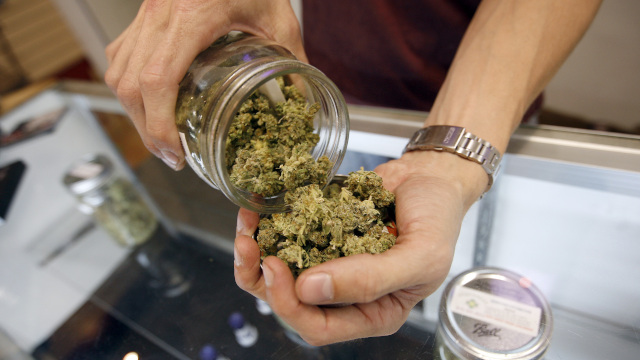
The New Yorker has published a long interview with President Obama, and one of the topics he addresses that are near and dear to Californian hearts: marijuana. Here's what Obama told New Yorker Editor David Remnick:
“As has been well documented, I smoked pot as a kid, and I view it as a bad habit and a vice, not very different from the cigarettes that I smoked as a young person up through a big chunk of my adult life. I don’t think it is more dangerous than alcohol.”
Is it less dangerous? I asked.
Obama leaned back and let a moment go by. That’s one of his moves. When he is interviewed, particularly for print, he has the habit of slowing himself down, and the result is a spool of cautious lucidity. He speaks in paragraphs and with moments of revision. Sometimes he will stop in the middle of a sentence and say, “Scratch that,” or, “I think the grammar was all screwed up in that sentence, so let me start again.”
Less dangerous, he said, “in terms of its impact on the individual consumer. It’s not something I encourage, and I’ve told my daughters I think it’s a bad idea, a waste of time, not very healthy.” What clearly does trouble him is the radically disproportionate arrests and incarcerations for marijuana among minorities. “Middle-class kids don’t get locked up for smoking pot, and poor kids do,” he said. “And African-American kids and Latino kids are more likely to be poor and less likely to have the resources and the support to avoid unduly harsh penalties.” But, he said, “we should not be locking up kids or individual users for long stretches of jail time when some of the folks who are writing those laws have probably done the same thing.” Accordingly, he said of the legalization of marijuana in Colorado and Washington that “it’s important for it to go forward because it’s important for society not to have a situation in which a large portion of people have at one time or another broken the law and only a select few get punished.”
As is his habit, he nimbly argued the other side. “Having said all that, those who argue that legalizing marijuana is a panacea and it solves all these social problems I think are probably overstating the case. There is a lot of hair on that policy. And the experiment that’s going to be taking place in Colorado and Washington is going to be, I think, a challenge.” He noted the slippery-slope arguments that might arise. “I also think that, when it comes to harder drugs, the harm done to the user is profound and the social costs are profound. And you do start getting into some difficult line-drawing issues. If marijuana is fully legalized and at some point folks say, Well, we can come up with a negotiated dose of cocaine that we can show is not any more harmful than vodka, are we open to that? If somebody says, We’ve got a finely calibrated dose of meth, it isn’t going to kill you or rot your teeth, are we O.K. with that?” Full interview
In California, the president's statements come as four pot legalization proposals vie for a spot on the November ballot, and where last month's Field Poll shows 55 percent of Californians favor legalization.
Mark DiCamillo heads the Field Poll, and he spoke with KQED's Mina Kim about the president's statements.